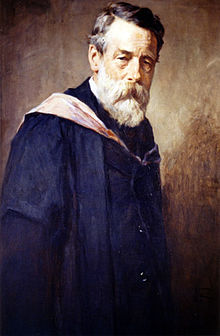James Strachan-Davidson
James Strachan-Davidson | |
|---|---|
 Portrait by George Reid, c. 1911 | |
| Born | James Leigh Strachan 22 October 1843 Byfleet, Surrey, England |
| Died | 28 March 1916 (aged 72) Oxford, England |
| Burial place | Holywell Cemetery, Oxford |
| Occupations |
|
James Leigh Strachan-Davidson (
Early life
James Leigh Strachan was born in
Education and career
Strachan-Davidson was enrolled at Leamington College at the age of eleven as day-boy.
He was appointed as the Classical tutor at
In 1899, he was appointed by the
Political views
Over the course of his many debates as part of the Oxford Union, he spoke in favour of the
He was consulted extensively by the Civil Service Commissioners during the reformation of the entrance examination of the Indian Civil Service.[24] He believed that the mental and moral discipline, wide view and grasp of fundamentals granted by the study of Literae Humaniores was crucial to the Service and drew up a memorandum to that effect, for its Royal Commission in June 1913.[25]
Personal life
Strachan-Davidson was devoted to his work at Balliol College and never married. He believed that the college should be as "wife and children" to a fellow of the college.[26] He was a friend of the English author Paul Ferdinand Willert[27] and was godfather to his daughter, Dorothy.[28] He was also close to his family doctor Robert Slack whose daughter Mary was his godchild.[29] He had another goddaughter, Margaret Bowlby, daughter of Henry Bowlby of Lancing College.[30] His closest friend was his contemporary, the English classical scholar Evelyn Abbott, with whom he spent most of his vacations.[31]
Death and legacy
Strachan-Davidson died on 28 March 1916 due to
He had acquired around 1500 to 1600 Greek and Roman coins during his many visits to Egypt, Italy, and Sicily. They mainly dated to the Macedonian, Ptolemaic, and Imperial Roman periods. This collection was
Selected works
Books
- Selections from Polybius (Oxford: Clarendon Press, 1888)[32][33]
- Cicero and the Fall of the Roman Republic (New York: Putnam, 1894)
- Appian's Civil Wars, Book I (Oxford: Clarendon, 1902)
- Problems of the Roman Criminal Law, 2 vols. (Oxford: Clarendon Press, 1912)
Articles
- "The Growth of Plebeian Privilege at Rome", The English Historical Review, Vol. 1, No. 2 (1886)
- "The Decrees of the Roman Plebs", The English Historical Review, Vol. 5, No. 19 (1890)
- "Mommsen's Roman Criminal Law", The English Historical Review, Vol. 16, No. 62 (1901)
- "Ancient Imperialism – II. Roman Republic", The Classical Review, Vol. 24, No. 4 (1910)
References
- ^ Mackail 1925, p. 10.
- ^ Davis & Smail 2004.
- ^ a b Procter 1992.
- ^ Mackail 1925, p. 11.
- ^ Mackail 1925, p. 12.
- ^ Mackail 1925, p. 16.
- ^ Mackail 1925, p. 19.
- ^ OU 1895, p. 177.
- ^ OU 1895, p. 305.
- ^ a b Mackail 1925, p. 20.
- ^ Foster 1893, p. 63.
- ^ Mackail 1925, p. 33.
- ^ Mackail 1925, p. 32.
- ^ Mackail 1925, p. 69.
- ^ J. A. S. 1916, p. 125.
- ^ Mackail 1925, p. 105.
- ^ Mackail 1925, pp. 94–95.
- ^ Salter & Lobel 1954.
- ^ a b Mackail 1925, p. 123.
- ^ Mackail 1925, pp. 88–89.
- ^ a b Mackail 1925, p. 21.
- ^ Mackail 1925, pp. 21–22.
- ^ a b Mackail 1925, p. 22.
- ^ Otte 2011, p. 14.
- ^ Mackail 1925, p. 84.
- ^ Mackail 1925, pp. 56–57.
- ^ Hopkins 2015, p. 140.
- ^ Mackail 1925, p. 24.
- ^ Mackail 1925, p. 76.
- ^ Mackail 1925, p. 98.
- ^ Mackail 1925, p. 30.
- ^ Tilley, Arthur (October 1888). "Review of Selections from Polybius edited by James Leigh Strachan-Davidson". The English Historical Review: 767–770.
- ^ Macan, R. W. (February 1889). "Review of Selections from Polybius edited by James Leigh Strachan-Davidson". The Classical Review: 30–32.
Sources
- Davis, H.; Smail, R. (23 September 2004). "Davidson, James Leigh Strachan- (1843–1916)". In Smail, Richard (ed.). required.)
- OCLC 667642014. Retrieved 1 May 2020.
- Hopkins, Gerard M. (2015). The Collected Works of Gerard Manley Hopkins: Volume III: Diaries, Journals, and Notebooks. Oxford University Press. ISBN 9780199534005. Retrieved 2 May 2020.
- J. A. S. (June 1916). "James Leigh Strachan-Davidson (1843–1916) and William Ross Hardie (1862–1916)". The Classical Review. 30 (4): 125–126. .
- OCLC 2328170.
- Otte, T. G. (29 September 2011). The Foreign Office Mind: The Making of British Foreign Policy, 1865–1914. Cambridge University Press. ISBN 9781139501408. Retrieved 1 May 2020.
- OU (1895). Oxford University Calendar 1895. Clarendon Press.
- Procter, Tim (1992). "Papers of James Leigh Strachan-Davidson". Balliol College Archives & Manuscripts. Balliol College. Retrieved 1 May 2020.
- Salter, Herbert E.; Lobel, Mary D. (1954). "Balliol College". A History of the County of Oxford: Volume 3: The University of Oxford. ISBN 9780712910644. Retrieved 1 May 2020.
